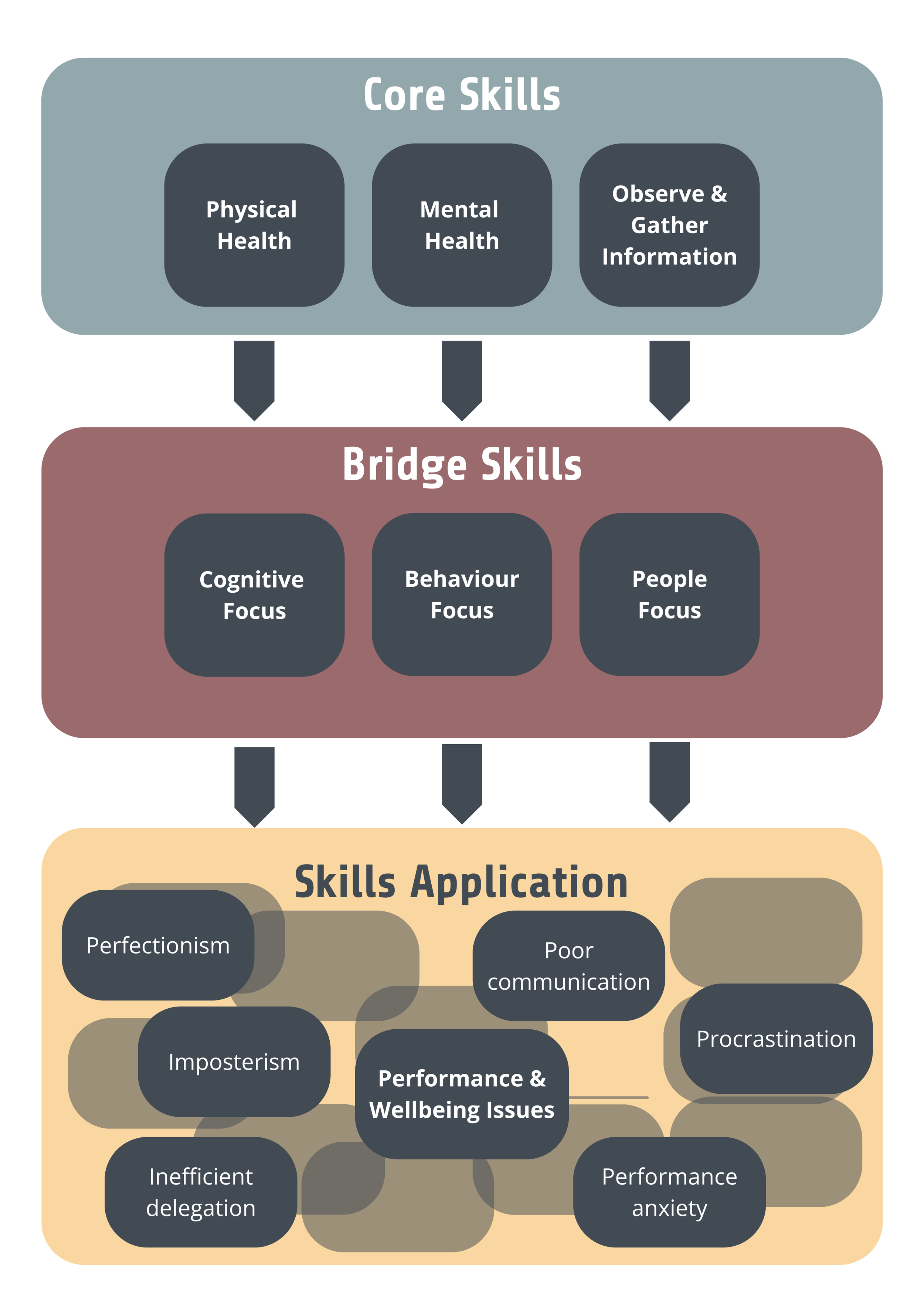Skills & Techniques
Skills and Techniques is divided into three sections:
Section One: Core Skills
1. Breathing
Good breathing technique brings many physical and psychological benefits.
Breathing techniques can be used for purposes beyond relaxing the body.
Extra resources:
A Scientific American article on the health benefits of correct breathing.
A review of studies indicating diaphragmatic breathing may decrease stress.
James Nestor’s book Breath and his suggestions to improve breathing.
2. Being Mode
‘Being Mode’ is a cognitive state in which we observe ourselves and our surroundings. Contrast this with ‘Doing Mode’ where we process information (e.g., interpreting the world, planning, etc).
Being mode is crucial for information gathering, objectively seeing the world, and managing difficult emotional states.
Download the body scan exercise audio
Extra resources:
Mindfulness primer
The Power of Now review
3. RIS Diary
A Relevant Internal State (RIS) is any inner psychological state of interest to performance and well-being.
Catching and describing a RIS is crucial to understanding what causes and maintains our challenges.
Extra resources:
Blank RIS diary form
4. Reflective Model
Structured reflection is a method to maximise learning from any significant experience, good or bad.
We apply new learning by changing our approach to performance and well-being issues.
Extra resources:
5. Fundamental Self-Care
A healthy diet, good sleep routine, and regular exercise have proven well-being benefits.
Understand key elements in these areas, and stay alert for psychological barriers to self-care.
Extra resources:
Section Two: Specific Skills
Cognition 1: Mindset
Mindset is your general game plan for any performance and wellbeing issue.
This is your cognitive starting point for successfully tackling challenges in your life.
Extra resources:
Book review of Mindset by Carol Dweck
Book review of Solving Life’s Problems by Nezu & others
Cognition 2: Biases & Heuristics
We are all prone to biases and heuristics that distort our thinking.
Understanding these distortions is key to fostering rational, objective thought processes for enhanced performance and wellbeing.
Extra resources:
Book review of Thinking Fast and Slow by Daniel Kahneman.
A list of thinking errors by the American Psychological Association.
Cognition 3: Questioning Technique
Unhelpful thoughts and thinking patterns require an adaptive response to minimise negative impact on performance and wellbeing.
The questioning technique is an excellent strategy to increase flexibility and objectivity in our thinking.
Extra resources:
A list of additional questions
Behaviour 1: Behaviour in RIS
Behaviours influence other RIS elements.
Understanding the function of behaviours is critical to modifying or replacing them most effectively.
Learn three important questions to help you understand the purpose of RIS behaviours.
Extra resources:
More information on reinforcement
Behaviour 2: Safety Behaviours
Safety behaviours are an important category of actions to understand.
We should be aware of safety behaviour categories and why they undermine performance and wellbeing.
Extra resources:
An example of applying safety behaviour management to health anxiety
Behaviour 3: Behaviour and Values
‘What’s the right response?’. A common question when faced with a RIS. But, there is often no actual ‘right’ or ‘wrong’ answer in life.
Values-based actions overcome this issue by focusing behaviour on what matters most to you.
Extra resources:
Section Three: Skills Application
Imposterism (Imposter Syndrome)
Imposterism is the failure to take appropriate credit for achievements. People with this problem fear being exposed as ‘frauds’, despite existing success in life and/or work.
Learn more about this concept and identify effective management strategies for this common challenge.
Perfectionism
Perfectionism involves excessively high, unrelenting standards that erode your performance, wellbeing, and relationships.
This discussion will help you understand the key components of perfectionism and the steps required to reduce the negative consequences of this phenomenon.
Procrastination
Procrastination is a complex issue involving psychological, behavioural, and environmental contributors.
Understand this challenge and identify key response strategies to increase efficient time use.
Coming Soon….
Burnout (March 15th, 2025)
Managing Difficult Conversations (April 15th, 2025)
Problem Solving (May 15th, 2025)
Intelligent Failure (June 15th, 2025)
How To Get Mentally Unstuck (July 15th, 2025)





